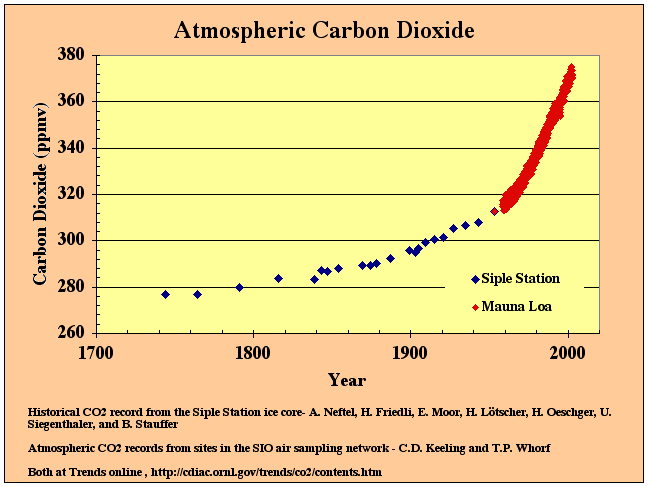Climate change is a significant and lasting change in the statistical distribution of weather patterns over periods ranging from decades to millions of years. It may be a change in average weather conditions, or in the distribution of weather around the average conditions (i.e., more or fewer extreme weather events). Climate change is caused by factors that include oceanic processes (such as oceanic circulation), variations in solar radiation received by Earth, plate tectonics and volcanic eruptions, and human-induced alterations of the natural world; these latter effects are currently causing global warming, and "climate change" is often used to describe human-specific impacts.
Scientists actively work to understand past and future climate by using observations and theoretical models. Borehole temperature profiles, ice cores, floral and faunal records, glacial and periglacial processes, stable isotope and other sediment analyses, and sea level records serve to provide a climate record that spans the geologic past. More recent data are provided by the instrumental record. Physically based general circulation models are often used in theoretical approaches to match past climate data, make future projections, and link causes and effects in climate change.
Richard A. Muller is an American professor of physics at the University of California, Berkeley, confirmed
the research of Stephen McIntyre and Ross McKitrick in which they criticized. A team led by climatologist Michael E Mann which produced the hockey stick graph of global temperatures over the past millennium.
Richard Muller quoted "call me a converted skeptic. Three years ago I identified problems in previous climate studied that, in my mind threw doubt on the very existence of global warming. Last, year following an intensive research effort involving a dozen scientist, I concluded that global warming was real and that prior estimates of the rate of warming were correct. I'm now going a step further: Humans are almost entirely the cause." This statement from the head of the Koch Funded study on climate change has made it official and that things will gradually get worst. Last month saw the USA's highest temperature, 134° on July 10, 1913 in Death Valley, Calif., is also the official highest temperature in the Western Hemisphere.
The global warming controversy was a variety of disputes about the nature, causes, and consequences of global warming. The debates were more in the popular media than in the scientific literature, and more in the United States than globally. In the scientific literature, there is a strong consensus that global surface temperatures have increased in recent decades and that the trend is caused mainly by human-induced emissions of greenhouse gases. No scientific body of national or international standing disagrees with this view, though a few organizations hold non-committal positions.
The skeptic argues that the graph that correlates carbon dioxide and temperature, when put together in comparing the values. The carbon dioxide graph follows the temperature (the carbon graph is lagging behind the temperature graph by 800 years) and not the other way round, also that carbon dioxide gas increases plant growth and photosynthesis production for making oxygen.
210 billion tons of carbon dioxide produced in one year, humans would produce 6.3 billion tons which is 3%. The rest is made by the natural causes like volcanoes oceans and vegetation decay. Water vapor in clouds a major component in green house gases, while carbon dioxide covers 2% of such asses followed by methane and chlorofluorocarbon and nitrous oxide. Though water may vary as the vapor could cause 36-70% of the total green house effect or in cloudy weather 66-86%, while carbon-dioxide covers 9-27%.
The Intergovernmental Panel on Climate Change, was first established in 1988 by two United Nations organizations(Maurice Strong), the World Meteorological Organization (WMO) and the United Nations Environment Programme (UNEP), and later endorsed by the United Nations General Assembly through Resolution 43/53. Its mission is to provide comprehensive scientific assessments of current scientific, technical and socio-economic information worldwide about the risk of climate change caused by human activity, its potential environmental and socio-economic consequences, and possible options for adapting to these consequences or mitigating the effects. Some people argue that the IPCC have a political agenda and that its founder Murices Strong have been a strong avocet for environmental reform since 1972.
Todays temperatures taken across the world to monitor the global situation seem to have reduced from over 6000 stations across the world to just over 1200 stations. This means the temperature resolution of any particular area is not accurate and that the computer model is averaging out the data which can be out by thousands of kilometers. Also this type of reduction can drastically alter the overall global temperature papering to rise if old data is added to the new temperature data.
It seems that the global warming debate have some serious problems in providing proper evidence considering that temperatures and data over the years have been altered. It doesn't help when the people who lobby for a tax on pollution have some hidden agenda. I am incline to reduce my carbon foot print on the car I drive not because of global warming, but because of growing fuel prices. The main issue of growing carbon dioxide can't be argued either way, as industry trys to soak up the last remaining fossil fuels. The change over to alternate power will be the main problem.
This is the every now and again wall posting of my blog filled with music, Film, science and my love of 8mm film and other geeky things...
Subscribe to:
Post Comments (Atom)








No comments:
Post a Comment